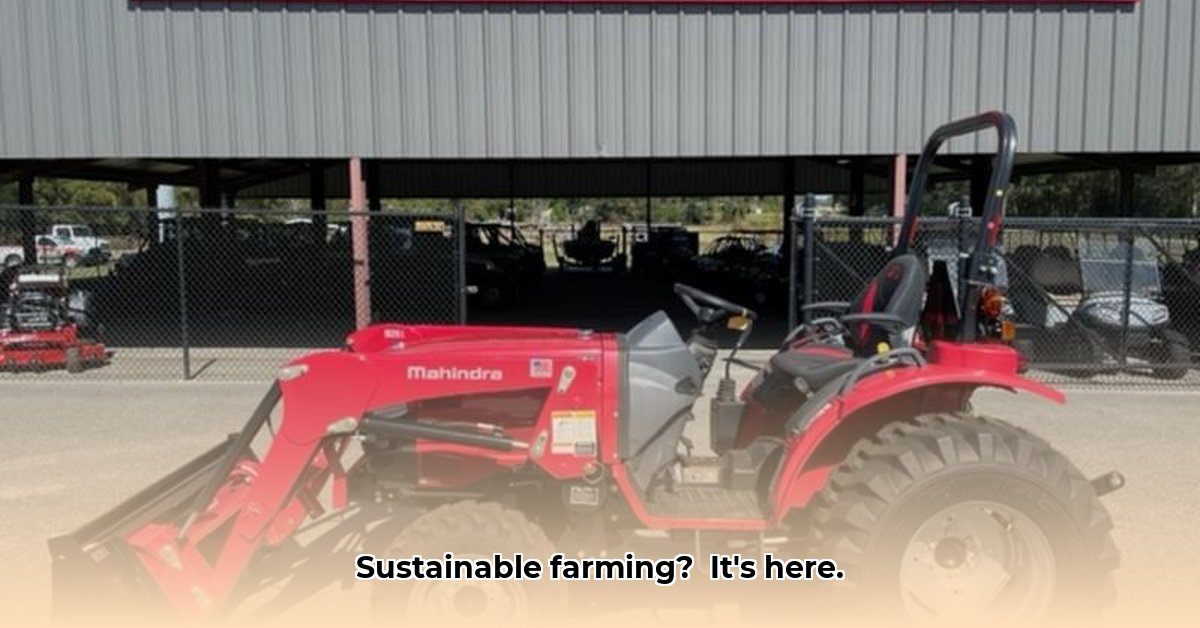
DeMott Tractor is a cornerstone of the local agricultural community, providing essential equipment to farmers in the region. While their contributions are significant, a deeper understanding of their specific sustainable agriculture practices is needed to fully assess their impact and identify opportunities for improvement. This article examines DeMott Tractor as a case study, exploring both challenges and opportunities within the context of sustainable farming. We'll provide actionable recommendations for DeMott, local farmers, equipment suppliers, and government agencies to foster a greener future together. For more background information, visit the DeMott Tractor website.
DeMott Tractor: A Closer Look
Detailed information about DeMott Tractor's history and business model remains limited. However, their established reputation for strong customer relationships suggests a commitment to service and responsiveness to farmer needs. This foundation is crucial for building a sustainable future. Further investigation into their operational practices, including their equipment sourcing, repair services, and waste management strategies, is needed to paint a complete picture of their sustainability footprint. This lack of readily available data presents a challenge, but one that can be addressed through targeted research and collaborative efforts.
Challenges and Opportunities on the Farm
DeMott Tractor, like many family-owned businesses, faces the common challenges of scaling operations while adapting to evolving market demands, including the growing emphasis on sustainable agriculture. The current absence of detailed data on their existing equipment's energy efficiency and environmental impact hinders a precise assessment of areas for improvement. However, several clear opportunities exist.
Could improved data collection and analysis unlock significant potential for growth in sustainable agriculture? The answer, overwhelmingly, is yes.
One key opportunity lies in forging strategic partnerships with companies specializing in sustainable agricultural technologies, including energy-efficient machinery and precision farming tools. This collaboration can lead to more environmentally responsible practices and reduced operational costs. Another area for improvement is the implementation of a robust customer relationship management (CRM) system. This will enhance communication, improve customer service, and enable more effective dissemination of information regarding sustainable farming practices.
Actionable Steps Towards a Greener Future
The following recommendations are based on general best practices in sustainable agriculture, informed by our current understanding of DeMott Tractor's potential. Further data collection is recommended to refine these suggestions.
For DeMott Tractor:
Conduct an Equipment Audit (Within 1 Year): Assess the energy efficiency of existing equipment to identify areas for improvement and future investment. This provides a baseline for tracking progress.
Implement a Customer Feedback Mechanism (Within 6 Months): Regularly survey customers to understand their needs and preferences regarding sustainable equipment and practices. Target a high response rate for valuable insights.
Invest in Staff Training (Ongoing): Provide employees with comprehensive training on sustainable agriculture practices, allowing for informed recommendations and effective customer support. This will lead to greater customer satisfaction and engagement.
Explore Strategic Partnerships (Long-Term): Collaborate with suppliers of sustainable agricultural technologies to expand equipment offerings and expertise. Strategic alliances will accelerate the company's sustainability initiatives.
For Local Farmers:
Engage in Open Communication with DeMott Tractor (Ongoing): Directly discuss equipment options and available sustainable practices to identify solutions suited to individual farm needs. This builds trust and facilitates knowledge transfer.
Explore Funding Opportunities (Ongoing): Investigate available grants and low-interest loans specifically designed to support the adoption of sustainable agricultural technologies. This might dramatically reduce financial barriers.
Embrace Precision Farming Technologies (Long-Term): These technologies offer significant potential for optimizing resource utilization, improving yields, and reducing environmental impact. Start small and scale up based on your needs and experience.
For Equipment Suppliers:
Strengthen Supply Chain Transparency (Ongoing): Enhance transparency about the environmental impact of their products through clear and accessible information. This supports informed decisions by both DeMott Tractor and local farmers.
Invest in Sustainable Product Development (Long-Term): Focus on developing and supplying more eco-friendly equipment to meet the increasing demand from environmentally conscious farmers. Innovation is key to long-term success.
For Government Agencies:
Expand Financial Incentives (Ongoing): Increase funding for grants and rebates to encourage farmers to adopt sustainable technologies. The return on this investment will be significant for the local economy and environment..
Invest in Educational Programs (Ongoing): Develop educational programs for farmers and related businesses on sustainable agriculture best practices and available resources. Knowledge is power – make it accessible.
Building a Sustainable Future Together
DeMott Tractor's journey towards sustainable agriculture is inextricably linked to the success of the broader farming community and the well-being of the local environment. By embracing proactive measures and collaborative efforts, DeMott not only strengthens its own position but also contributes to a more sustainable and prosperous future for all. Further research into DeMott's specific operations and detailed data analysis are crucial steps to realizing this shared vision. The path to a greener future requires commitment, innovation, and the willingness to work together across all stakeholders.